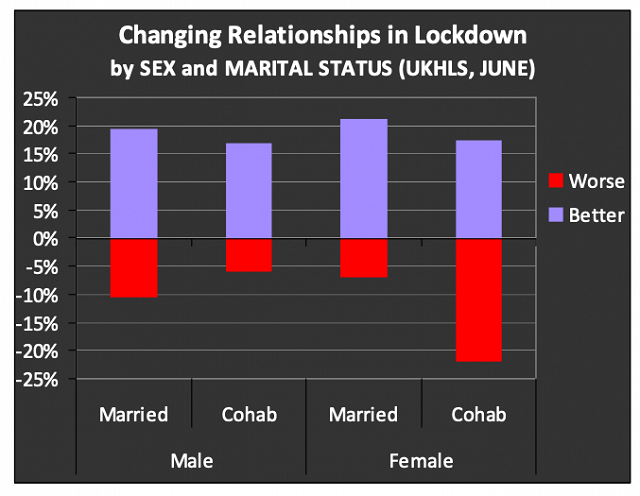The lockdown has not worsened marriage, according to a new study. Fewer parents than before reported that they were considering divorce and 20pc said that their relationship has improved.
What is the effect of the lockdown on marriage and
relationships? When it began in many countries, there were speculations that the
lockdown would have put extra stress on relationships, but a study based on the
UK Household Longitudinal Survey Coronavirus Study (University of Essex 2020)
found that this is not the case.
The Marriage Foundation analysed 2,559 parents which were married or cohabiting. Maybe surprisingly, 20pc of respondents said that their relationship had improved, while only 10pc said theirs got worse. (The quality of the relationship remained the same for 70pc.)
The difference is significant. It means that twice as
many couple relationships improved during the lockdown compared to those that
worsened instead. Among “happy” couples, there was no substantial difference
between those who were married and those cohabiting.
However, cohabiting women were found to have struggled more during the last months. The study shows that more cohabiting
mothers said their relationship had got worse (22pc) rather than better (17pc).
They were the only cohort reporting this happening to them. In all other
cohorts, the percentage of those noticing an improvement in their relationship
was higher than those claiming the opposite.
22pc of cohabiting mothers lamenting a worsen
relationship is noteworthy, particularly when we realise that this was the case
for just 6pc of cohabiting fathers, 7pc of married mothers and 11pc of married
fathers.
A possible reason is that women living with less
committed men experience the constraints of the lockdown more negatively. They
feel more pressure on a relationship that is more unstable and less secure.
“Cohabiting mothers were by far the most likely group
to struggle during lockdown, to say their relationship had got worse, that they
were experiencing significantly higher levels of conflict, and that they had
more regrets about getting together in the first place”, the researchers found.
Married women, instead, were the cohort showing the highest percentage of improved relationships.
The authors of the study note: “Compared to married
mothers, the odds of a relationship worsening were 3.3 times greater for
cohabiting mothers and 1.5 times greater for married fathers.” (p. 3)
This is perhaps due to the fact that having committed fathers more present in the house helped those women in sharing more housework and, consequently, also improved the quality of their relationship? Another contributing factor could be that the increased presence of fathers also strengthened the bond with their children. (A different research found that 26pc of parents reported improved relationship with their children during the lockdown, while only 4pc reported worse relationship.)
The researchers from the Marriage Foundation compared
the current results with previous similar studies conducted in 2017-19 and
found there was little or no change in unhappiness among mothers while fathers,
both married and cohabiting, showed slightly higher level of unhappiness.
Some commentators were anticipating a post-lockdown
divorce boom but now it seems this will be hardly the case. Parents were asked
how often they had considered divorce or separation. The highest percentage was
among cohabiting women (2.7pc). Among
married and cohabiting fathers and mothers, about two thirds fewer than before
reported they had often considered divorce.
This study confirms the importance of marriage, as a public commitment, in hard
times and the positive effects it has on couples and, consequently, on society.
The authors note: “When people think about commitment, they are usually thinking about "dedication," the extent to which couples want to be together. They forget about the constraints around a relationship that make couples have to be together. When couples want to be together, constraints that make them have to be together are positive and affirming. But when the relationship is more uncertain or ambiguous, then additional constraints—such as having a baby, moving in together, or going into lockdown—can feel very uncomfortable and more like a trap.”

Nessun commento:
Posta un commento